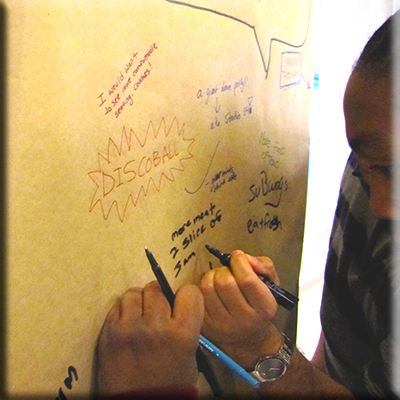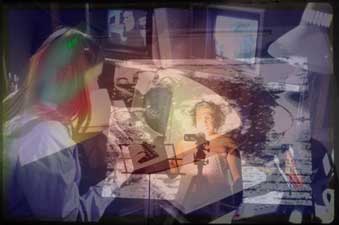Lateral’s Theory Thread offers essays that critically explore the relationship of carceral and educational institutions—but not as alternatives to one another as often has been assumed in various kinds of social activism. The authors of these essays, Sora Han, David Stein, Shana Agid, Gillian Harkins and Erica R. Meiners, assume the tightly knotted interrelationship of prisons and schools and instead address the question posed by Han: is there something, being affirmed in the identity or identification as a “prison abolitionist” today?
Articles by Patricia Ticineto Clough
\Patricia Ticineto Clough is professor of Sociology and Women\'s Studies at the Graduate Center and Queens College of the City University of New York. She is author of Autoaffection: Unconscious Thought in the Age of Teletechnology (2000); Feminist Thought: Desire, Power and Academic Discourse (1994) and The End(s) of Ethnography: From Realism to Social Criticism (1998). She is editor of The Affective Turn: Theorizing the Social, (2007) and with Craig Willse, editor of Beyond Biopolitics: Essays on the Governance of Life and Death (2011). She is currently working on Ecstatic Corona: Philosophy and Family Violence, an ethnographic historically researched experimental writing project about where she grew up in Queens New York.\
Lateral is Back
Lateral II is also, like the first, a braiding of research threads. This time we offer a triple helix. The Cultural Industries thread, curated by Jaafar Aksikas, presents a conversation between two nodes of cultural studies that move in and outside the academy Ien Ang’s Institute for Culture and Society at the University of Western Sydney, and the Cultural Studies Praxis Collective at the University of Washington. This intersectoral work hints at an alter-economy, what it terms a negotiation with partners for critical purchase that complicates the reductive rubrics of neoliberal exchange. The Theory Thread, curated by Patricia Clough features a dossier on digital feminism assembled by Katherine Behar. This too is an effort to find value beyond measure, but also to refuse the algorithms of success, to assert the ungoogleable, the necessary failure, in pursuit of an anti-search engine that might power other reservoirs of thought. The Universities in Question Thread, is curated by student activists Megan Turner and Niall Twohig, and art from the smARTaction collective curated by Tina Orlandini. This dossier of manifestos and art works from various university mobilizations and occupations from Quebec, Cairo, Occupy Wall Street, University of California, and University of Puerto Rico, document the creativity that lies within critical mobilizations and the contagious proliferation of forms that this emergent politics takes.
Introduction: In Search of Digital Feminisms
Edited by Katherine Behar and Silvia Ruzanka, In Search of Digital Feminisms includes five essays and the editors’ introduction that suggests we play with the shift from surfing to searching to what is fast becoming the offer, if not the intrusion, of piles of unrequested information. But In Search of Digital Feminisms is not an exercise in melancholia, longing for better digital days now past or for lost feminist horizons. It is a search, having already arrived at a destination, a before and an after all at once, the lost origin that always points to the work of an originary mediation or modulation, if not digitization. In other words, these are not anti-technology works; these are works seeking rather to find ways to creativity and multiplicity in identity and practice that can be an intervention into the contemporary scenes of feminisms and the digital. Although primarily offered as texts, the works that follow point to the need to make theoretical interventions a matter of practices, a matter of interactive mediation, a doing, if not a doing with others.
Editors’ Introduction
In this inaugural issue, Lateral takes the form of a cluster of four research threads. The initial threads converge around a consideration of knowledge formations, institutional and material location, and political intervention and implication. The initial four threads are meant as an exploration of what is possible and an invitation for further work. Theory and Method, curated by Patricia Clough, treats various forms of knowing and being in cultural studies research. Creative Industries, curated by Jaafar Aksikas, invites composite methodological approaches to intersectoral flows inside and outside the university. Universities in Question, curated by Bruce Burgett and Randy Martin, decenters established claims for disciplinary, labor, and political economic legitimations for higher education. Mobilisations, Interventions, and Cultural Policy curated by Emma Dowling, pursues current transformational activisms to rethink values of polity, policy, and participation.
Introduction: Theory and Method
The Theory and Method Thread of Lateral launches its first publication with two essays, one by John Mowitt of Cultural Studies and Comparative Literature at University of Minnesota and one by Jared Sexton, Director of African American Studies, School of Humanities at University of California Irvine. Together their essays along with responses by Christina Sharpe of American Studies at Tufts University, Adam Sitze of Black Studies and Law, Jurisprudence and Social Thought at Amherst College and Morgan Adamson of Cultural Studies and Comparative Literature at University of Minnesota, all take theory to one of the most pressing, worldly and yet intimate, of issues faced by each of us, whether working in and/or outside the academy: that is, the conditions of study, or studies, in the University.


